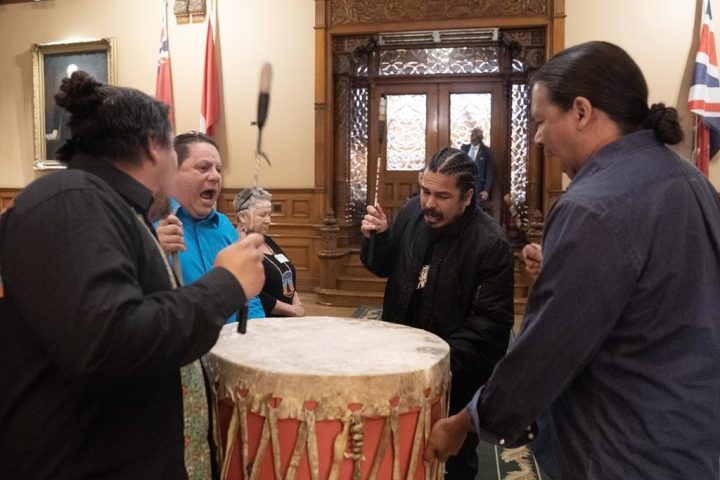Dozens of members of an Ontario First Nation gathered in Toronto on Thursday as part of their efforts to reclaim their land and prized possessions.

Ojibways of Garden River First Nation Ketegaunseebee beat their drums in a show of strength as they entered Queen’s Park after filing a lawsuit against the province and the federal government alleging a large swath of their land was stolen.
The First Nation’s leadership then surprised their Elders with a viewing of a 200-year-old pipe that belonged to the man who helped start Garden River in the 1800s, Chief Shingwaukonse. The Royal Ontario Museum, which has had the pipe since its inception in 1914, brought the pipe to the legislature.
The great-granddaughter of Chief Shingwaukonse, Doreen Lesage, hovered her hand over the pipe as tears welled up in her eyes. She wiped those tears away and held her hands to her heart.
“It’s indescribable what it means to me,’ she said. “My heart is just heavy right now, but my heart is full, very full.”
Her grandson, Cole Nolan, a historian who works with Garden River First Nation, said they are in repatriation negotiations with the Royal Ontario Museum for the pipe and several other items that belonged to Chief Shingwaukonse.
Nolan helped broker the pipe’s visit to the New Democrat caucus room at the legislature.
“Today is probably one of the greatest honours of my life to be able to do this for my community, for my family members,” he said, choking up.
“These items are so important to our people, our families.”
A curator with the Royal Ontario Museum said the repatriation process is in its early stages.

Get breaking National news
Chief Shingwaukonse’s items were sold to Dr. Oronhyatekha, a physician from Six Nations of the Grand River, who had money and collected Indigenous items related to land claims around the time of Confederation, Justin Jennings said.
Oronhyatekha died in 1907 and his estate eventually donated Chief Shingwaukonse’s items to the museum, which has had them since they opened in 1914.
“We just wanted it to be here because this was something important to the chief and the community,” Jennings said.
Garden River’s current chief, Andy Rickard, said he’s held positive conversations with the museum about repatriating Chief Shingwaukonse’s items.
But it has been a difficult few days in Toronto for the band members of Garden River, which is located near Sault Ste. Marie, Ont.
“It’s very special,” Rickard said. “We had ceremony in one of the back rooms at the ROM and when you left there, you felt like you were leaving family behind.”
The First Nation also filed its lawsuit earlier this week, saying a large swath of its land was stolen.
In 1850, the Crown and Garden River signed the Robinson Huron Treaty. That treaty was prompted by Chief Shingwaukonse’s occupation of a mine in protest of the Crown encroachment on its territory.
The First Nation suffered famine and economic hardships after that treaty, the statement of claim says.
The Crown continued to pressure Garden River to give up all of its land, and eventually, Garden River relented to give up some of it by 1859, the claim said.
But the Crown pressured a vulnerable population to sign that treaty, the claim said, which meant losing 70 per cent of its territory.
“It was extremely coercive in nature,” Rickard said.
The Crown sold off some of that land to farmers and developers, the claim said.
Sol Mamakwa, an Indigenous legislator with the New Democrats at Queen’s Park, said the approach by both the province and the federal government when dealing with First Nations is not working.
“The days of divide and conquer, the days of talking about jobs, funding, resources, does not work anymore,” he said.
“We need to start a dialogue about self-determination on land issues and self governance of our people.”
The province and the federal government declined to provide immediate comment.
But the thought of reclaimed land and sacred items gives Lesage, the great-granddaughter of Chief Shingwaukonse, hope.
She still has the medals her father gave her that were awarded to Chief Shingwaukonse by the Crown and British North American forces for his feats on the battlefield in the War of 1812.
But the thought that more of his items, like his pipe, could return to Garden River First Nation moved her to tears.
“This is a very emotional moment for me, but it’s just something I never expected to see in my lifetime because I’ll be 87 years old soon,” she said. “I’m just so grateful that I was able to see this.”








Comments
Want to discuss? Please read our Commenting Policy first.